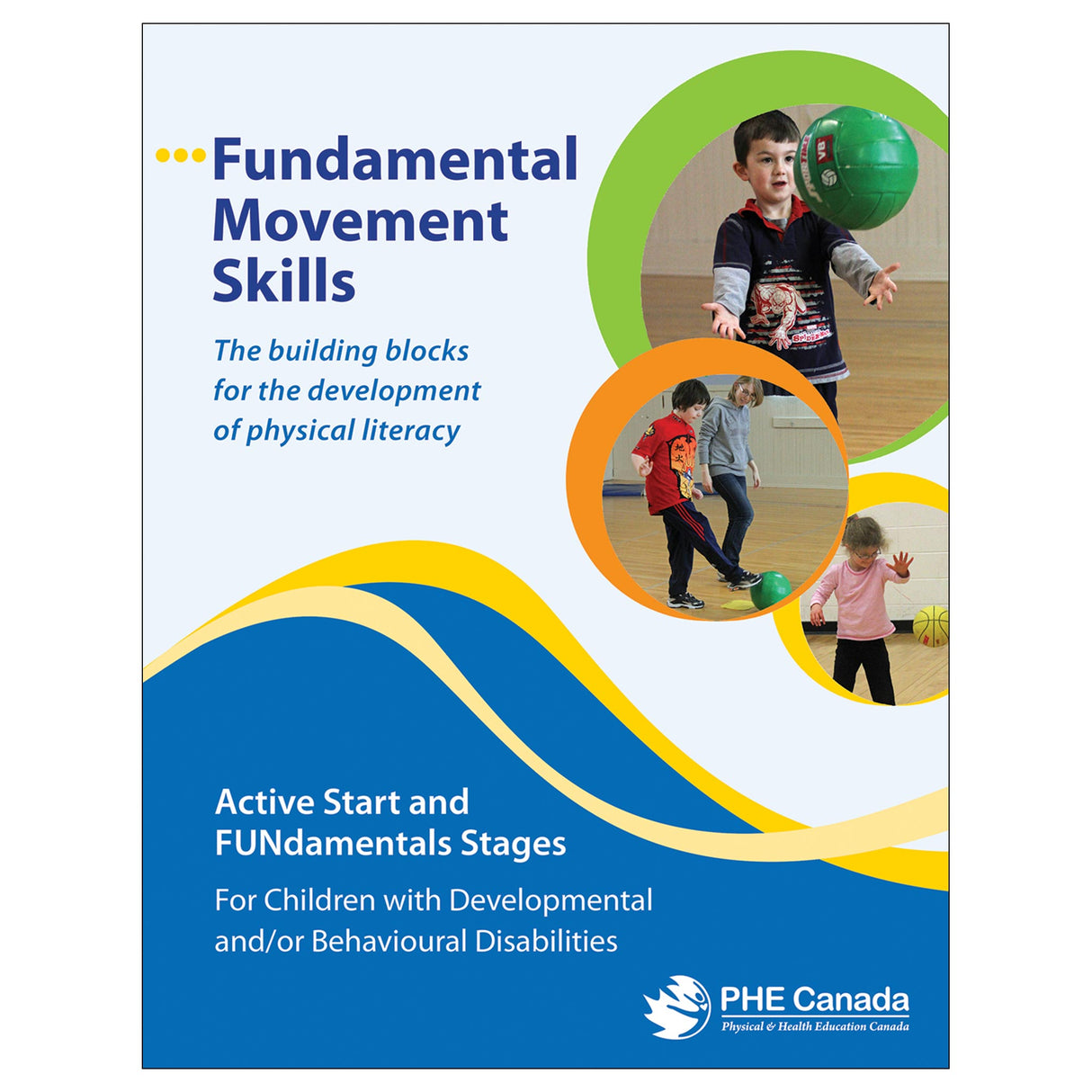Spiral bound
Fundamental Movement Skills: Active Start and FUNdamentals Stages - For Children with Developmental and/or Behavioural Disabilities
The building blocks for the development of physical literacy
Author: PHE Canada
$44.95 CAD
Unit price
/
Unavailable
Spiral bound
$44.95 CAD
$44.95 CAD
Spiral bound
Fundamental Movement Skills: Active Start and FUNdamentals for Children With Developmental and/or Behavioural Disabilities provides the theory and practice to enable physical activity leaders in developing learners’ fundamental movement skills in an effective, fun, and interactive manner. This is achieved by providing the following:
This resource employs best practices for inclusion and adaptations (modifications to equipment, environment, instructions, and rules) to cater to the needs of children with developmental and behavioural disabilities. Specific adaptations are provided for children who have autism spectrum disorder, Down syndrome, attention-deficit/hyperactivity disorder, developmental coordination disorder, and intellectual disabilities.
- Descriptions and characteristics of the mature movement patterns of fundamental movement skills
- Photographs of each of the fundamental movement skills
- Practical and specific teaching tips to help physical activity leaders in developing children’s fundamental movement skills and physical literacy
- A wide variety of activities that utilize the featured skills
- A checklist for assessment of fundamental movement skills
This resource employs best practices for inclusion and adaptations (modifications to equipment, environment, instructions, and rules) to cater to the needs of children with developmental and behavioural disabilities. Specific adaptations are provided for children who have autism spectrum disorder, Down syndrome, attention-deficit/hyperactivity disorder, developmental coordination disorder, and intellectual disabilities.
Audience
Teachers, coaches, and recreational leaders of children with physical disabilities who are in the Active Start and FUNdamentals stages of the Long-Term Athlete Development (LTAD) Model. Part I. Introduction
How to Use This Resource
Overview of the Disabilities and Associated Behavioural Considerations Included in This Resource
Autism Spectrum Disorder (ASD)
Autistic Disorder (AD)
Pervasive Developmental Disorder–Not Otherwise Specified (PDD-NOS)
Asperger Syndrome (AS)
Down Syndrome (DS)
Attention-Deficit/Hyperactivity Disorder (ADHD)
Developmental Coordination Disorder (DCD)
Intellectual Disability (ID)
Long-Term Athlete Development (LTAD) Model for Athletes With an Intellectual Disability
Physical Literacy
Online Innovative E-learning
A Developmental Approach to Motor Skill Development
Safety
Individualized Education Plans (IEPs)
Best Practices in Inclusion
Range of Participation
Adaptations: Task/Curriculum, Equipment, Environment, Instructions, Rules
Social Stories
Use of Peer Tutors
Behaviour Management Techniques
Instructional Strategies to Promote Appropriate Behaviour
For More-Challenging Behaviours
Social Skills Training in Physical Education
Importance of Self-Determination
Continuum of Prompts
Part II. Fundamental Movement Skills
Dodge
Hop
Skip
Log Roll
Stork Stand
Jump (Horizontal)
Kick
Dribble
Throw (Overhand and Underhand)
Catch
Run
Sidearm Strike
Part III. References
Appendix 1: List of Activities
Appendix 2: Adapted Equipment Resources
Appendix 3: Disability Organizations
Appendix 4: Adapted Physical Education Textbooks and Articles for Reference
Appendix 5: Other Websites of Interest
Appendix 6: Canadian Disability Sport Organizations
Appendix 7: Paralympic Sport Programs
Appendix 8: Fundamental Movement Skills Series
How to Use This Resource
Overview of the Disabilities and Associated Behavioural Considerations Included in This Resource
Autism Spectrum Disorder (ASD)
Autistic Disorder (AD)
Pervasive Developmental Disorder–Not Otherwise Specified (PDD-NOS)
Asperger Syndrome (AS)
Down Syndrome (DS)
Attention-Deficit/Hyperactivity Disorder (ADHD)
Developmental Coordination Disorder (DCD)
Intellectual Disability (ID)
Long-Term Athlete Development (LTAD) Model for Athletes With an Intellectual Disability
Physical Literacy
Online Innovative E-learning
A Developmental Approach to Motor Skill Development
Safety
Individualized Education Plans (IEPs)
Best Practices in Inclusion
Range of Participation
Adaptations: Task/Curriculum, Equipment, Environment, Instructions, Rules
Social Stories
Use of Peer Tutors
Behaviour Management Techniques
Instructional Strategies to Promote Appropriate Behaviour
For More-Challenging Behaviours
Social Skills Training in Physical Education
Importance of Self-Determination
Continuum of Prompts
Part II. Fundamental Movement Skills
Dodge
Hop
Skip
Log Roll
Stork Stand
Jump (Horizontal)
Kick
Dribble
Throw (Overhand and Underhand)
Catch
Run
Sidearm Strike
Part III. References
Appendix 1: List of Activities
Appendix 2: Adapted Equipment Resources
Appendix 3: Disability Organizations
Appendix 4: Adapted Physical Education Textbooks and Articles for Reference
Appendix 5: Other Websites of Interest
Appendix 6: Canadian Disability Sport Organizations
Appendix 7: Paralympic Sport Programs
Appendix 8: Fundamental Movement Skills Series





